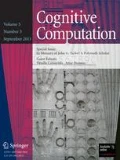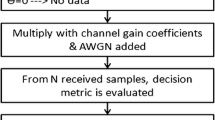Abstract
This paper investigates the multiuser multiple-input–multiple-output (MIMO) linear cooperative spectrum sensing optimization problem, in which the primary user (PU) and the cognitive radio (CR) are equipped with multiple antennas. By optimizing the different weights assigned on the received signals of CRs, the cooperative spectrum sensing optimization aims at maximizing the probability of detection given a targeted probability of false alarm. Statistical characteristics of parameters in MIMO cooperative spectrum sensing systems have been determined for the PU with a single antenna and the CR with multiple antennas, the PU with multiple antennas and the CR with a single antenna, and both the PU and the CR with multiple antennas. Because of the non-convex characteristic of the optimization problem, an alternative approach based on a genetic algorithm (GA) instead of convex approaches is proposed to find the optimal weight vectors without solution domain restrictions and convexity constraints. Furthermore, several classical GA crossover operators have been provided to investigate their effect on sensing performance. The simulation results show that, the reliability of spectrum sensing in cooperative spectrum sensing system can be significantly improved with multiple antennas. Furthermore, the GA method is a promising approach in addressing the cooperative spectrum sensing problem.









Similar content being viewed by others
References
Hong X, Wang C, Chen H, Zhang Y. Secondary spectrum access networks. IEEE Veh Technol Mag. 2009;4(2):36–43.
al-Rifaie MM, Bishop JM, Caines S. Creativity and autonomy in swarm intelligence systems. Cognit Comput. 2012;4(3):320–31.
Taylor JG. Cognitive computation. Cognit Comput. 2009;1(1):4–16.
Sutton PD, Nolan KE, Doyle LE. Cyclostationary signatures in practical cognitive radio applications. IEEE J Select Areas Commun. 2008;26(1):13–24.
Ganesan G, Li YG. Cooperative spectrum sensing in cognitive radio networks. In: Proceedings of the IEEE symposium new frontiers dynamic spectrum access networks (DySPAN05), Baltimore, USA. 2005. p. 137–43.
Zarrin S, Lim TJ. Belief propagation on factor graphs for cooperative spectrum sensing in cognitive radio. In: Proceedings of the IEEE DySPAN. 2008. p. 1–9.
Peh E, Liang YC. Optimization for cooperative sensing in cognitive radio networks. In: Proceedings of the Hong Kong: IEEE wireless communication and networking Conference. 2007. p. 27–32.
Ma J, Zhao G, Li Y. Soft combination and detection for cooperative spectrum sensing in cognitive radio networks. IEEE Trans Wirel Commun. 2008;7(11):4502–7.
Unnikrishnan J, Veeravalli VV. Cooperative sensing for primary detection in cognitive radio. IEEE J Sel Top Signal Process. 2008;2(1):18–27.
Quan Z, Cui S, Sayed AH. Optimal linear cooperation for spectrum sensing in cognitive radio network. IEEE J Sel Top Signal Process. 2008;2(1):28–40.
Quan Z, Ma W-K, Cui S, Sayed AH. Optimal linear fusion for distributed detection via semidefinite programming. IEEE Trans Signal Process. 2010;58(4):2431–6.
Arshad K, Moessner K. Optimisation of collaborative spectrum sensing with SIMO cognitive terminals using genetic algorithm. In: Proceedings of the IEEE 20th International Symposium on Personal, Indoor and Mobile Radio Communications, Tokyo, Japan. 2009. p. 13–6.
Arshad K, Ali Imran M, Moessner K. Collaborative spectrum sensing optimisation algorithms for cognitive radio networks. Int J Dig Multimed Broadcast. 2010;2010:424036. doi:10.1155/2010/424036.
ElSaleh AA, Ismail M, Mohd Ali MA. Genetic algorithm-assisted soft fusion-based linear cooperative spectrum sensing. IEICE Electron Express. 2011;8(18):1527–33.
An J, Kang Q, Wang L, Wu QD. Mussels wandering optimization: an ecologically inspired algorithm for global optimization. Cognit Comput. 2013;5(2):188–99.
Tang Q, Shen Y, Hu CY, Zeng JY, Gong WY. Swarm intelligence: based cooperation optimization of multi-modal functions. Cognit Comput. 2013;5(1):48–55.
AlRifaie MM, Bishop JM, Caines S. Creativity and autonomy in swarm intelligence systems. Cognit Comput. 2012;4(3):320–31.
Reeves Colin R, Rowe Jonathan E. Genetic algorithms: principles and perspectives: a guide to GA theory. Norwell, MA: Kluwer Academic Publisher; 2004.
Goldberg DE. Genetic algorithms in search, optimization and machine learning. New York: Addison-Wesley; 1998.
Tawil E, Hagras H. An adaptive genetic-based incremental architecture for the on-line coordination of embedded agents. Cognit Comput. 2009;1(4):300–26.
Acknowledgments
The authors would like to show our gratitude to reviewers for insightful comments and suggestions that have enhanced the quality and readability of this paper. This work was supported by the 111 Project (B08038), the National Science Foundation of China under Grant (61101069,61201134,61201135) and the Fundamental Research Funds for the Central Universities (JB140107, K5051302022,72132826), the National Key Project of New Generation Broad Band Wireless Communication (2012ZX03001027-001).
Author information
Authors and Affiliations
Corresponding author
Rights and permissions
About this article
Cite this article
Hei, Y., Li, W., Li, M. et al. Optimization of Multiuser MIMO Cooperative Spectrum Sensing in Cognitive Radio Networks. Cogn Comput 7, 359–368 (2015). https://doi.org/10.1007/s12559-014-9297-5
Received:
Accepted:
Published:
Issue Date:
DOI: https://doi.org/10.1007/s12559-014-9297-5




